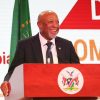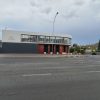Omanyano ovanhu koikundaneki yomalungula kashili paveta, Commisiner Sakaria takunghilile
Veronika Haulenga
Omanyano ovanhu koikundaneki yomalungula kashili paveta, Commisiner Sakaria takunghilile
Veronika Haulenga
Listeners:
Top listeners:
-
play_arrow
Omanyano ovanhu koikundaneki yomalungula kashili paveta, Commisiner Sakaria takunghilile Veronika Haulenga
Empowering West African Youth Through Training in Agroforestry, Live-stock, and Fisheries Innovation
The ECOWAS Commission has awarded a grant of $1,033,991 to twenty-five (25) regional cen-ters, including nine (9) focused on agricultural innovation, six (6) dedicated to agronomic re-search, and ten (10) specializing in vocational training in agroecology and organic agriculture. This funding initiative is designed to train 3,142 young people, enhancing their skills by com-plementing theoretical knowledge with practical expertise, while promoting innovation and capacity-building in the agroforestry, livestock, and fisheries sectors.
Additionally, the program sought to equip participants with sustainable agricultural practices tailored to small-scale producers and key value chain actors in the region, promoting envi-ronmentally intensive and inclusive production systems.
A regional workshop opened on Monday, 29 October 2024, in Abuja, Nigeria, to review the out-comes of these training programs, identify challenges, and explore solutions. The event brings together center directors and trained participants to align efforts with the ECOWAS regional strategy for youth employment in agricultural value chains.
Representing the President of the ECOWAS Commission, H.E. Dr Omar Alieu Touray, and the Commissioner for Economic Affairs and Agriculture, H.E. Massandjé Touré-Litsé, commended the efforts of the center directors. She acknowledged their dedication to providing young people with the knowledge, skills, and resources required to thrive in agriculture, forestry, livestock farming, and fisheries.
“The importance of these sectors in our region cannot be overstated. Agriculture, forestry, livestock, and fisheries are not only pillars of our economies but also the backbone of our communities. These sectors ensure food security, create jobs and sustain the livelihoods of millions of our citizens. It is essential to invest in young people, who will drive future growth, sustainability, and innovation within these critical areas,” she stated.
H.E. TOURÉ-LITSÉ noted that the workshop aims not only to assess the training programs and capitalize on the best approaches but also to reflect on achievements, identify obstacles, and collectively develop best practices for broader application. Given the program’s potential re-newal, the focus will be on achieving greater impact moving forward.
“The potential of this initiative is vast. We have seen how the adoption of modern technolo-gies, sustainable practices, and community-based approaches has transformed local econo-mies. By equipping our youth with these tools, we are investing not only in the present but also in the future development of our region,” she added.
Reaffirming the ECOWAS Commission’s commitment to supporting youth empowerment across West Africa, H.E. TOURÉ-LITSÉ assured participants that the Commission would contin-ue to ensure young people receive the training, opportunities, and support they need to lead, innovate, and contribute meaningfully to the socio-economic growth of their countries.
She encouraged participants to engage in fruitful discussions, fostering collaboration and in-novation, and developing actionable recommendations that will contribute to a more impact-ful and sustainable future for the region.
“Let us seize this opportunity to refine our strategies, expand our horizons, and, most im-portantly, empower the next generation of leaders in agriculture and fisheries,” she conclud-ed.
The workshop will feature several presentations, including an overview of the regional strate-gy for youth employability in the agroforestry, livestock, and fisheries sectors, to be delivered by Mr Alain Sy Traoré, ECOWAS Director of Agriculture and Rural Development.
Additional presentations, supported by video reports from the young participants, will show-case the technical aspects and outcomes of their training programs.
Distributed by APO Group on behalf of Economic Community of West African States (ECOWAS).
Similar posts
Windhoek Weather
Most popular

Mbumba signs off new benefits for retired political office bearers

Former FNB employee arrested after defraud pensioner off N$215, 000

Namdia Heist: More questions, lots of confusion

Omuhwahwameki Michael okuunganeka oshikonga shoku patitha oostola dho Rani moshilongo ashihe.

Walvis Bay woman loses over N$777.000 to a fraudster
Copyright 2025 Future Media (Pty) Ltd | Website by Digital Platforms
Tel: +264 83 000 1000 | Email: news@futuremedia.com.na



